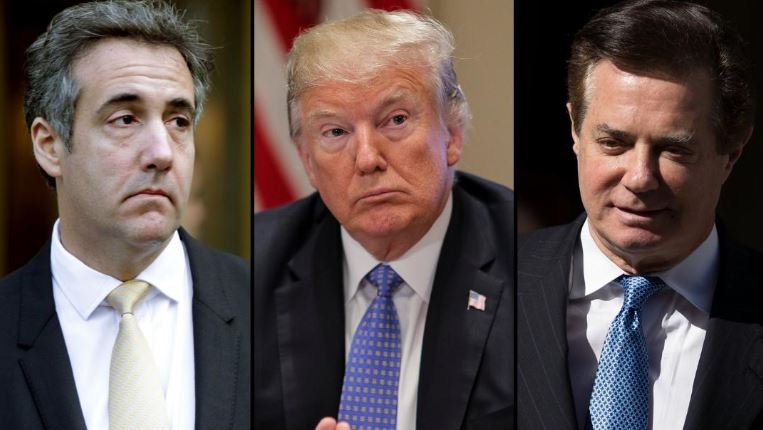The Extent of the Trump-Kremlin Conspiracy Is Becoming Much Clearer Now
Throw all the prosecutorial sentencing reports together that emerged yesterday about Michael Cohen and Paul Manafort, stir gently, and what do we have? The commentary was so quick to get to the details, that it is useful to pull back and see the whole picture:
- These are two bad guys who committed crimes, small and large, and they will get real jail time. Cohen will get a bit of relief in his sentence for cooperating partially, but not a magic wand dismissal of prison time. Manafort is facing up to 15 years for crimes so far—after he blew his chances for leniency by lying to the special counsel’s office to whom he had promised cooperation.
- Trump committed felonies for hush-money payoffs to women for sex in violation of campaign finance laws, according to the U.S. government. That would sink anyone who isn’t the President of the United States, but Trump will hold himself above the law, by saying the president cannot be indicted.
- What happens next is anyone’s guess or more the business of politics than of law. From Trump himself, there was a tweet, of course, saying these filings cleared him of any wrongdoing—despite the words in the document. We need to start hearing from Republican leaders, but with Democrats taking over the House, these documents will prompt endless hearings and necessary discussions about Trump’s involvement, up to the impeachment discussions that many Democrats are trying to avoid. And with a new attorney general nominee, we will go through more questions about letting the special counsel finish his work.
We now know that prosecutors are proving Russian efforts at leverage in the Trump campaign and in the U.S. elections.
The talking heads are going nuts, of course. There were three highly anticipated sentencing filings that pundits hoped might offer more information about where the investigation by Special Counsel Robert S. Mueller III is headed. We did not get that, exactly, but in two separate filings on Cohen and one on Manafort, we learned several new things.
About Manafort, the one-time head of the Trump campaign, a heavily redacted sentencing guidance from Mueller’s team said he should go to jail for a long time. The redactions kept a lot of reasons secret, but Mueller’s team said Manafort lied about his interactions with Konstantin Kilimnik, a Russian associate who Mueller has said has ties to the Russian military intelligence unit accused of hacking Democrats, and how they may have worked together to tamper with witnesses following Manafort’s arrest last year. Manafort also lied about a particular wire transfer, about an unrelated case, and about maintaining a continuing relationship with the president’s legal team. Most of the details were filed under seal with the court.
About Cohen, there were separate sentencing recommendations from the U.S. attorney for the Southern District of New York on financial crimes and the cases involving the hush-money payments to Stormy Daniels, the adult-film actress whose actual name is Stephanie Clifford, and Karen McDougal, a former Playboy model, to conceal affairs they said they had with Trump. The document cited evidence to show that Trump had directed the payments in violation of campaign finance laws. But the prosecutors rejected Cohen’s request to avoid a prison term and saying that he had “repeatedly used his power and influence for deceptive ends” and had not cooperated all that much with them.
The second sentencing document was from Mueller’s team, in which the special counsel said that Cohen did cooperate and should get no additional prison time beyond whatever penalty, probably four years imprisonment, arise from the New York charges. This document gave more information about Cohen leading prosecutors through months’ worth of contacts with Russians over a lucrative proposed Trump Tower Moscow project, several other attempts (plural) with other Russian nationals to reach out to the Trump campaign during 2015 to offer “political synergy” and lots of testimony about the “preparation and circulation” of Cohen’s testimony to Congress. Former prosecutors went on TV to say this last point represents apparent evidence of obstruction of justice by the Trump White House.
About Trump. None of the documents were about the president directly, of course, but Individual 1, the president, was omnipresent in the sleazy businesses at hand. Only Trump, lawyer Rudy Giuliani or his most ardent supporters could read these documents and not come away with a certain solemnness about the degree of criminal scheming involving Trump, his business and his campaign.
At the minimum, we now know that Cohen has offered information that is leading prosecutors to prove Russian efforts at leverage in the Trump campaign and in the U.S. elections, the heart of all the talk of “collusion.” At worst, these documents were prompting political talking heads to talk about Trump by using references as a possible Russian-version “Manchurian candidate.”
My job in this column is not to sanctify the evidence or to assign blame. But it is to note that we have entered into the very serious business part of the special counsel investigation and about what we are learning to be factual.
What is clear is that we need to stop talking about witch hunts and start talking about the word evidence.




